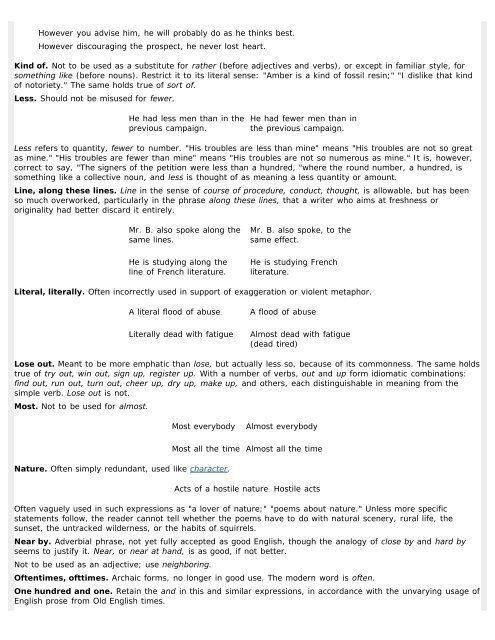The Complete Online Filmmaking Reference - Film Distribution ...
The Complete Online Filmmaking Reference - Film Distribution ...
The Complete Online Filmmaking Reference - Film Distribution ...
You also want an ePaper? Increase the reach of your titles
YUMPU automatically turns print PDFs into web optimized ePapers that Google loves.
However you advise him, he will probably do as he thinks best.<br />
However discouraging the prospect, he never lost heart.<br />
Kind of. Not to be used as a substitute for rather (before adjectives and verbs), or except in familiar style, for<br />
something like (before nouns). Restrict it to its literal sense: "Amber is a kind of fossil resin;" "I dislike that kind<br />
of notoriety." <strong>The</strong> same holds true of sort of.<br />
Less. Should not be misused for fewer.<br />
He had less men than in the<br />
previous campaign.<br />
He had fewer men than in<br />
the previous campaign.<br />
Less refers to quantity, fewer to number. "His troubles are less than mine" means "His troubles are not so great<br />
as mine." "His troubles are fewer than mine" means "His troubles are not so numerous as mine." It is, however,<br />
correct to say, "<strong>The</strong> signers of the petition were less than a hundred, "where the round number, a hundred, is<br />
something like a collective noun, and less is thought of as meaning a less quantity or amount.<br />
Line, along these lines. Line in the sense of course of procedure, conduct, thought, is allowable, but has been<br />
so much overworked, particularly in the phrase along these lines, that a writer who aims at freshness or<br />
originality had better discard it entirely.<br />
Mr. B. also spoke along the<br />
same lines.<br />
He is studying along the<br />
line of French literature.<br />
Mr. B. also spoke, to the<br />
same effect.<br />
He is studying French<br />
literature.<br />
Literal, literally. Often incorrectly used in support of exaggeration or violent metaphor.<br />
A literal flood of abuse A flood of abuse<br />
Literally dead with fatigue Almost dead with fatigue<br />
(dead tired)<br />
Lose out. Meant to be more emphatic than lose, but actually less so, because of its commonness. <strong>The</strong> same holds<br />
true of try out, win out, sign up, register up. With a number of verbs, out and up form idiomatic combinations:<br />
find out, run out, turn out, cheer up, dry up, make up, and others, each distinguishable in meaning from the<br />
simple verb. Lose out is not.<br />
Most. Not to be used for almost.<br />
Nature. Often simply redundant, used like character.<br />
Most everybody Almost everybody<br />
Most all the time Almost all the time<br />
Acts of a hostile nature Hostile acts<br />
Often vaguely used in such expressions as "a lover of nature;" "poems about nature." Unless more specific<br />
statements follow, the reader cannot tell whether the poems have to do with natural scenery, rural life, the<br />
sunset, the untracked wilderness, or the habits of squirrels.<br />
Near by. Adverbial phrase, not yet fully accepted as good English, though the analogy of close by and hard by<br />
seems to justify it. Near, or near at hand, is as good, if not better.<br />
Not to be used as an adjective; use neighboring.<br />
Oftentimes, ofttimes. Archaic forms, no longer in good use. <strong>The</strong> modern word is often.<br />
One hundred and one. Retain the and in this and similar expressions, in accordance with the unvarying usage of<br />
English prose from Old English times.


